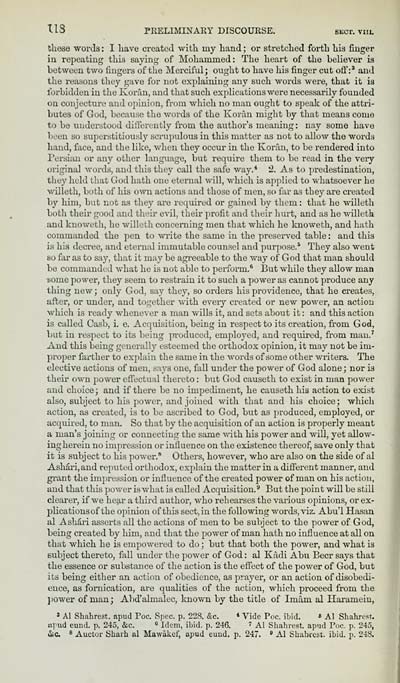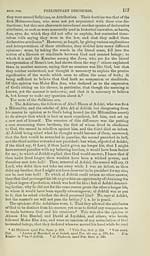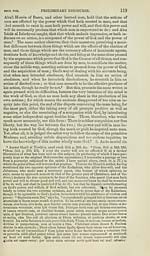Download files
Complete book:
Individual page:
Thumbnail gallery: Grid view | List view

XIS PRELIMINARY DISCOURSE. bkct. viil
these words : I Lave created with my hand ; or stretched forth his finger
in repeating this saying of Mohammed: The heart of the believer is
between two fingers of the Merciful; ought to have his finger cut ofi":' and
the reasons they gave for not explaining any such words were, that it is
forbidden in the Koran, and that such explications were necessarily founded
on conjecture and opinion, from which no man ought to speak of the attri-
butes of God, because the Avords of the Koran might by that means como
to be understood differently from the author's meaning : nay some have
been so superstitiously scrupulous in this matter as not to allow the words
hand, face, and the like, when they occur in the Koran, to be rendered into
Persian or any other language, but require them to be read in the very
original words, and this they call the safe way.* 2. As to predestination,
they held that God hath one eternal will, which is applied to whatsoever he
willeth, both of his own actions and those of men, so tuv as they are created
by him, but not as they are required or gained by them : that he willeth
both their good and their evil, their profit and their hui-t, and as he Avilleth
and knoweth, he willeth concerning men that which he knoweth, and hath
commanded the pen to wi-ite the same in the preserved table : and this
is his decree, and eternid immutable counsel and puri)ose.* They also went
so far as to say, that it may be agi-eeable to the way of God that man should
be commanded what he is not able to perform.* But while they allow man
some power, they seem to restrain it to such a power as cannot produce any
thing new; only God, say they, so orders his providence, that he creates,
after, or under, and together Avith eveiy created or new power, an action
which is ready whenever a man wills it, and sets about it : and this action
is called Cash, i. e. Acquisition, being in respect to its creation, fi-om God,
but in respect to its being p-oduced, employed, and required, from man.'
And this being generally esteemed the orthodox opinion, it may not be im-
proper farther to explain the same in the words of some other wi-iters. The
elective actions of men, says one, fall under the power of God alone ; nor is
their own power effectual thereto : but God causeth to exist in man power
and choice ; and if there be no imijediment, he causeth his action to exist
also, subject to his power, and joined with that and his choice; which
action, as created, is to be ascribed to God, but as produced, employed, or
acquii-ed, to man. So that by the acquisition of an action is properly meant
a man's joining or connecting the same ■s\'ith his power and will, yet aUow-
ing herein no impression or influence on the existence thereof, save only that
it is subject to his power." Others, however, who are also on the side of al
Ash£ri,and reputed orthodox, explain the matter in a different manner, and
grant the impression or influence of the created power of man on his action,
and that this power is what is called Acquisition.^ But the point will be still
clearer, if we he9,r a third author, who rehearses the various opinions, or ex-
plications of the opinion of tliis sect, in the following words, viz. Abu'l Hasan
al Ashdri asserts all the actions of men to be subject to the poAver of God,
being created by him, and that the power of man hath no influence at all on
that which he is empowered to do ; but that both the power, and what is
subject thereto, fell under the power of God : al Kadi Abu Beer says that
the essence or substance of the action is the effect of the power of God, but
its being either an action of obedience, as prayer, or an action of disobedi-
ence, as fornication, are qualities of the action, which proceed from the
})0wer of man; Abd'almalec, known by the title of Imam al Haramein,
» Al Shahrest. apud Poc. Spec. p. 228. &c. * Vide Poc. ibid. « Al Shahrcst.
apud eund. p. 245, &c. * Idem, ibid. p. 246. ^ a1 Shahrest. apud Poc. p. 245,
&c * Auctor Sharh al Mawakef, apud eund. p. 247. ' Al Shahrest. ibid. p. 248.
these words : I Lave created with my hand ; or stretched forth his finger
in repeating this saying of Mohammed: The heart of the believer is
between two fingers of the Merciful; ought to have his finger cut ofi":' and
the reasons they gave for not explaining any such words were, that it is
forbidden in the Koran, and that such explications were necessarily founded
on conjecture and opinion, from which no man ought to speak of the attri-
butes of God, because the Avords of the Koran might by that means como
to be understood differently from the author's meaning : nay some have
been so superstitiously scrupulous in this matter as not to allow the words
hand, face, and the like, when they occur in the Koran, to be rendered into
Persian or any other language, but require them to be read in the very
original words, and this they call the safe way.* 2. As to predestination,
they held that God hath one eternal will, which is applied to whatsoever he
willeth, both of his own actions and those of men, so tuv as they are created
by him, but not as they are required or gained by them : that he willeth
both their good and their evil, their profit and their hui-t, and as he Avilleth
and knoweth, he willeth concerning men that which he knoweth, and hath
commanded the pen to wi-ite the same in the preserved table : and this
is his decree, and eternid immutable counsel and puri)ose.* They also went
so far as to say, that it may be agi-eeable to the way of God that man should
be commanded what he is not able to perform.* But while they allow man
some power, they seem to restrain it to such a power as cannot produce any
thing new; only God, say they, so orders his providence, that he creates,
after, or under, and together Avith eveiy created or new power, an action
which is ready whenever a man wills it, and sets about it : and this action
is called Cash, i. e. Acquisition, being in respect to its creation, fi-om God,
but in respect to its being p-oduced, employed, and required, from man.'
And this being generally esteemed the orthodox opinion, it may not be im-
proper farther to explain the same in the words of some other wi-iters. The
elective actions of men, says one, fall under the power of God alone ; nor is
their own power effectual thereto : but God causeth to exist in man power
and choice ; and if there be no imijediment, he causeth his action to exist
also, subject to his power, and joined with that and his choice; which
action, as created, is to be ascribed to God, but as produced, employed, or
acquii-ed, to man. So that by the acquisition of an action is properly meant
a man's joining or connecting the same ■s\'ith his power and will, yet aUow-
ing herein no impression or influence on the existence thereof, save only that
it is subject to his power." Others, however, who are also on the side of al
Ash£ri,and reputed orthodox, explain the matter in a different manner, and
grant the impression or influence of the created power of man on his action,
and that this power is what is called Acquisition.^ But the point will be still
clearer, if we he9,r a third author, who rehearses the various opinions, or ex-
plications of the opinion of tliis sect, in the following words, viz. Abu'l Hasan
al Ashdri asserts all the actions of men to be subject to the poAver of God,
being created by him, and that the power of man hath no influence at all on
that which he is empowered to do ; but that both the power, and what is
subject thereto, fell under the power of God : al Kadi Abu Beer says that
the essence or substance of the action is the effect of the power of God, but
its being either an action of obedience, as prayer, or an action of disobedi-
ence, as fornication, are qualities of the action, which proceed from the
})0wer of man; Abd'almalec, known by the title of Imam al Haramein,
» Al Shahrest. apud Poc. Spec. p. 228. &c. * Vide Poc. ibid. « Al Shahrcst.
apud eund. p. 245, &c. * Idem, ibid. p. 246. ^ a1 Shahrest. apud Poc. p. 245,
&c * Auctor Sharh al Mawakef, apud eund. p. 247. ' Al Shahrest. ibid. p. 248.
Set display mode to: Large image | Transcription
Images and transcriptions on this page, including medium image downloads, may be used under the Creative Commons Attribution 4.0 International Licence unless otherwise stated. ![]()
| Early Gaelic Book Collections > J. F. Campbell Collection > Koran: or, Alcoran of Mohammed > (140) |
|---|
| Permanent URL | https://digital.nls.uk/77135635 |
|---|
| Description | Volumes from a collection of 610 books rich in Highland folklore, Ossianic literature and other Celtic subjects. Many of the books annotated by John Francis Campbell of Islay, who assembled the collection. |
|---|
| Description | Selected items from five 'Special and Named Printed Collections'. Includes books in Gaelic and other Celtic languages, works about the Gaels, their languages, literature, culture and history. |
|---|

